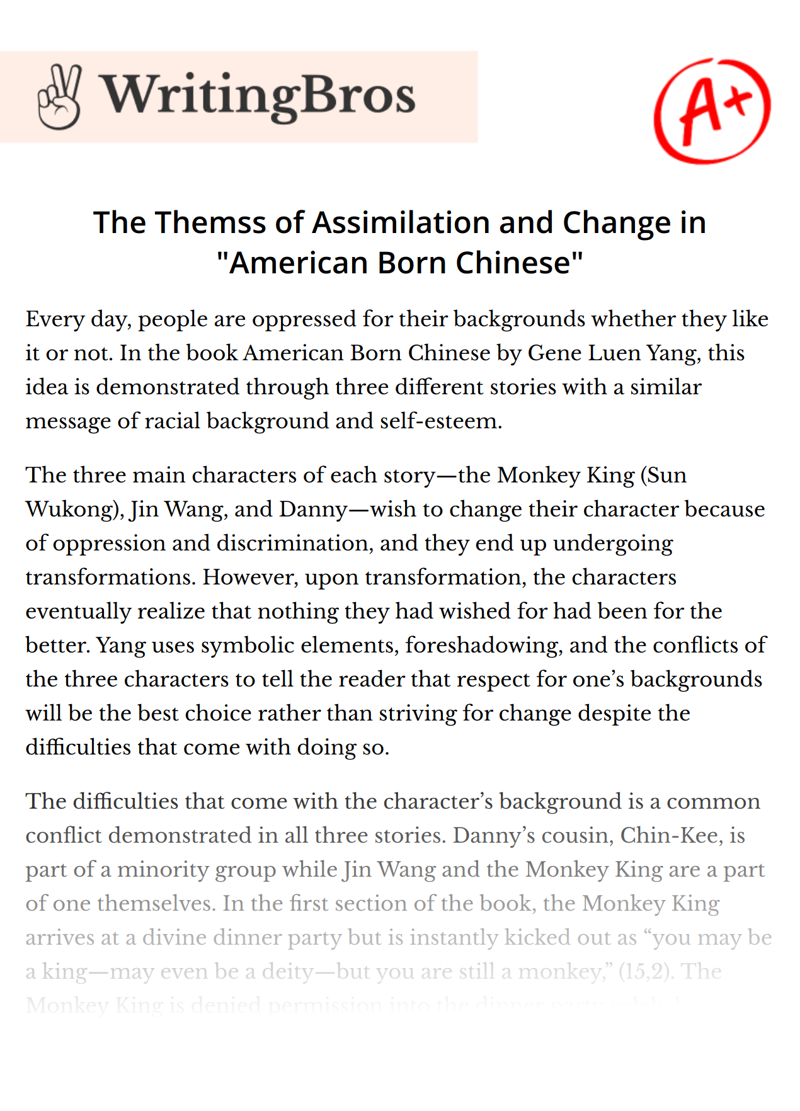The Themss of Assimilation and Change in "American Born Chinese"

Every day, people are oppressed for their backgrounds whether they like it or not. In the book American Born Chinese by Gene Luen Yang, this idea is demonstrated through three different stories with a similar message of racial background and self-esteem.
The three main characters of each story—the Monkey King (Sun Wukong), Jin Wang, and Danny—wish to change their character because of oppression and discrimination, and they end up undergoing transformations. However, upon transformation, the characters eventually realize that nothing they had wished for had been for the better. Yang uses symbolic elements, foreshadowing, and the conflicts of the three characters to tell the reader that respect for one’s backgrounds will be the best choice rather than striving for change despite the difficulties that come with doing so.
The difficulties that come with the character’s background is a common conflict demonstrated in all three stories. Danny’s cousin, Chin-Kee, is part of a minority group while Jin Wang and the Monkey King are a part of one themselves. In the first section of the book, the Monkey King arrives at a divine dinner party but is instantly kicked out as “you may be a king—may even be a deity—but you are still a monkey,” (15,2). The Monkey King is denied permission into the dinner party solely because he is a monkey, unlike all the other deities. As for Jin, he is bullied by some racist classmates for being Chinese; “Come on, let’s leave Bucktooth alone so he can enjoy Lassie,” (33, 4). This demonstrates the idea of discrimination and racism of minority groups in society. For Danny, his cousin Chin-Kee being in a minority group and extremely stereotypical while following him around gives him extreme embarrassment from all the attention they receive. This gives the reader a reverse scenario where it is not the minority group struggling but instead the ones associated with the minority.
Even with that in mind, it is important to know that, despite the hardships of one’s racial background, trying to change who one is will not improve anything. Each story has the main character undergo a transformation; this is where the stories of Jin Wang and Danny connect, as Danny is actually Jin’s transformed white self. After their transformations, they expect society to view them acceptably. However, not only were their old problems somewhat unaffected, but new problems of equal magnitude arose. The Monkey King, even after changing his form and name, still housed the same personality—stubborn and wanting acceptance.
He also struggled to spread his new name across Heaven as the gods were incredulous; “[The Monkey King] then visited Lao-Tzu, patron of immortality… Yama, caretaker of the underworld… and the Jade Emperor, ruler of the celestials. All of them needed convincing,” (65-66,1). The Monkey King’s further actions create a chain of violent events that end with him imprisoned for 50 centuries. This shows the reader that even though the Monkey King tried to change, all he ended up doing was adding gas to a flame. As for Jin, his transformation no longer made him part of the minority group, but this had no effect on his relationship status, one of his main reasons for the transformation; he also gained a new conflict, Chin-Kee. As he once said to Chin-Kee near the end, “I’m sick of you ruining my life, Chin-Kee! I want you to pack up and go back to where you came from,” (205,1). Jin (or, during this scene, Danny) struggled with his stereotypical Chinese cousin about as equally as the racial comments during his previous self. This tells the reader that new conflicts arise with equal struggle even after a change.
When one considers the story’s elements of conflict, foreshadowing, and symbolism, they can see that change is not always the best solution to racial, cultural, and ethnical oppression, so it is wiser to stick to the group they’re more familiar with. Oppression and discrimination is a very common conflict in our everyday lives, and because of these methods, people will feel pressured to change their character. Even if one changes, they will still have trouble as their new character; that is the negative power of racism and opinion, and yet these kinds of thoughts and opinions still survive and grow everywhere as if it were cancer.
Cite this Essay
To export a reference to this article please select a referencing style below

